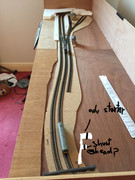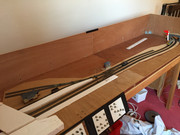Era being modelled: BR late crest. Region, somewhere in the midlands, originally a Midland railway turned LMS, turned BR LMR, but fictitious.
Annotated photos for reference below. I have a small goods yard which is to be served by pick up / drop off goods trains, where trains will need
to shunt, propelling into the yard. I am placing an advanced starter signal at the end of the layout where I have drawn it on. My question is, for a prototypical layout, do I need a shunt ahead subsiduary arm on this post? This would be needed in case the train being shunted is too long to fit between the points and signal.
In terms of the actual model, the largest train the fiddleyard can hold is not long enough to need a shunt ahead, so the signal wont actually be used for model workings, I'm asking from a prototypical standpoint. The goods yard is also small, so in my mind this may mean it is not served by any particularly large goods trains, however I have no knowledge of the workings of any real place like this in this time, so that assumption may be wrong.
The scale distance between points and advances starter signal is just over 100m.
Fundamentally, I'd like to know if it would make sense with or without a shunt ahead, and if either one would be unprototypical. (It will save a fair bit of effort if I don't need to make the subsiduary arm.)
Thanks for your help!

